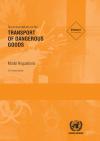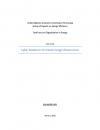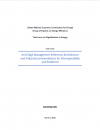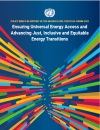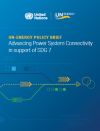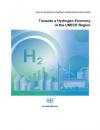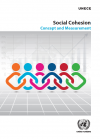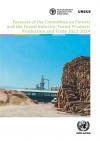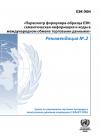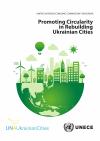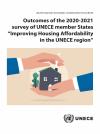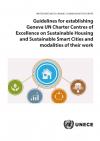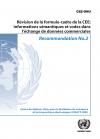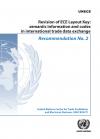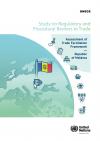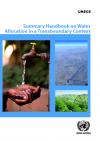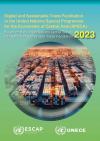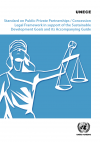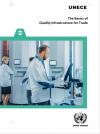Publications
Displaying Results 41 - 60 of 2807
- English
The free, non-editable electronic version of the Model Regulations, Rev.23 is available here for consultation purposes.
Printed versions and electronic editable versions are available for sale at the United Nations Publications section at
- English
Digitalization is gaining more and more attention as a way to support and complement the energy transition process. Digitalization entails the use of digital technologies for existing processes, as it helps address existing challenges in new ways.
While using an integrated energy system with intelligent connected devices has many advantages, it also causes challenges. One of these challenges is
- English
This case study addresses the challenge of distributed energy resources integration to support grid resilience, identifying key infrastructure requirements, assessing policy developments and deriving recommendations. The underlying premise of this case study asserts that whilst the energy sector is making advances towards decarbonization, decentralization and digitalization, the increasing share
- English
The sixth compilation of the SDG 7 Policy Briefs, titled "Ensuring Universal Energy Access and Advancing Just, Inclusive and Equitable Energy Transitions," prepared by the SDG 7 Technical Advisory Group (SDG7 TAG), in support of the review of the SDGs at the United Nations High-Level Political Forum 2023.
- English
This UN-Energy Policy Brief was prepared in support of the SDG7 review at the High-level Political Forum 2023 in line with the UN-Energy Plan of Action Towards 2025. The Plan outlines UN-Energy’s contributions towards the implementation of the Global Action Plan for Accelerated SDG 7 Action presented by the UN Secretary-General as an outcome of the UN High-level Dialogue on Energy in 2021. The
- English
The United Nations’ 1994 International Conference on Population and Development (ICPD) in Cairo set a bold new vision of the relationships between population, development and individual rights and well-being. It recognized that population was not about numbers, but about people, and that individual dignity and human rights are the basis for individual well-being and sustainable development.
Ahead
- English
Hydrogen is an energy carrier that can decarbonize economies and promote sustainable economic growth and system resilience. Although many low-emission hydrogen projects have been announced over the past two years, a mere 4% of them have reached a final investment decision. This indicates that achieving the scale and pace of hydrogen deployment requires more decisive actions from policymakers and
- English
Social cohesion, broadly speaking, is the ‘glue’ that binds society together.
Societies with higher levels of social cohesion are healthier, more resilient to external shocks, and experience greater economic growth. An understanding of social cohesion helps us make sense of a wide range of topics including globalization, ethnic and group fragmentation, inequalities and barriers to social mobility
- English
This publication is the statistical supplement to the 81st session of the Committee on Forests and the Forest Industry about the current and next year's forest products markets. The tables in the publication show detailed forest products production and trade forecasts by country for 2023 and 2024. The tables are generated based on submissions by more than 20 member States from Europe, North
- Pусский
Рекомендация № 2 Европейской экономической комиссии (ЕЭК) Организации Объединенных Наций была первоначально утверждена одновременно с Рекомендацией № 1 ЕЭК «Формуляр-образец Организации Объединенных Наций для внешнеторговых документов», чтобы подчеркнуть важность четкого определения используемой в документах информации и рекомендовать применение перечней кодов, когда это возможно. Позднее она
- English
This publication contains a background note for the thematic workshop on promoting circularity in rebuilding Ukrainian cities, organized on 25 November 2022. The first part covers key challenges faced by cities in Ukraine, as well as key national legal acts and regulations relevant to circularity, key organizations and data, and key national and local programmes in place before and during the war
- English
This publication contains the results of a survey on improving housing affordability in the UNECE region, conducted in 2020. The UNECE Committee on Urban Development, Housing and Land Management (CUDHLM) organized this survey to explore the views of UNECE member States on key challenges, policies and needs in relation to housing affordability. The aim was to inform the UNECE secretariat how it
- English
This publication is a guidance document for establishing Geneva UN Charter Centres of Excellence to implement the Geneva UN Charter on Sustainable Housing. It provides guidelines for the mode of work of the Centres and the organization of communication between the Centres, the Housing and Land Management secretariat and the Committee.
- Français
La Recommandation no 2 de la Commission économique pour l’Europe (CEE) a été initialement approuvée en même temps que la Recommandation no 1 intitulée « Formule-cadre des Nations Unies pour les documents commerciaux » afin de souligner qu’il importait d’arrêter une définition univoque des informations figurant dans les documents et de recommander l’utilisation de listes de codes dans la mesure du
- English
United Nations Economic Commission for Europe (ECE) Recommendation No. 2 was originally approved at the same time as ECE Recommendation No. 1: United Nations Layout Key for Trade Documents to underline the importance of unambiguous definition of the information in documents and to recommend the use of code lists to the extent possible. It was later integrated into the United Nations Layout Key
- English
This study (ECE/TRADE/477) provides information regarding the current state of play of the trade facilitation framework and the remaining outstanding Category C commitments, including the current standing with respect to the implementation status of specific measures, further capacity needs, and recommendations for the way forward. It also specifies which recommendations refer to mandatory
- English
This Summary Handbook on Water Allocation in a Transboundary Context (Summary Handbook) contains the key information from the Handbook on Water Allocation in a Transboundary Context (Handbook) adopted by the 9th Meeting of the Parties (MOP9) to the Water Convention in 2021, covering the global practice of transboundary water allocation. It seeks to be a shorter and targeted practical resource for
- English
This report is part of a global survey effort on the implementation of trade facilitation and paperless trade measures, undertaken jointly by the five United Nations Regional Commissions for Africa (ECA), Europe (ECE), Asia and the Pacific (ESCAP), Latin America and the Caribbean (ECLAC) and West Asia (ESCWA) as well as the United Nations Conference on Trade and Development (UNCTAD).
This report
- English
When properly structured and implemented, Public-Private Partnerships (PPPs) can fulfil a range of valuable purposes and objectives for the benefit of society and the common good. They can advance the efficient and cost-effective development, provision and operation of public infrastructure and public services, by harnessing the skills, resources, know-how and/or finance of the private sector
- English
Quality infrastructure is the unsung hero of trade; it is essential for market access whilst promoting essential regulatory objectives such as safety, quality and sustainability in industrial goods. But it is not well known by the general public. This publication provides a baseline understanding of the different elements of quality infrastructure and some insight as to how this affects trade
